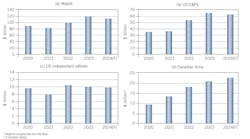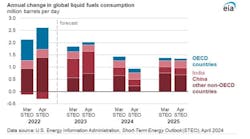Crude oil prices retreated Apr. 9 following the broader market down on a weak jobs report by the US government at the end of last week, but natural gas regained 0.8% in the New York market.
“The broader market’s losing streak was extended yesterday as the Standard & Poor’s 500 Index slumped 1.1%,” said analysts in the Houston office of Raymond James & Associates Inc. “The light unemployment report sparked comments from [Federal Reserve Chairman] Ben Bernanke that regulators must continue to find ways to strengthen the banking sector. The losing streak is actually tied for the longest losing streak year-to-date at four consecutive sessions.”
James Zhang at Standard New York Securities Inc., the Standard Bank Group, said, “The oil market came under continuous pressure after the US non-farm payroll number for March was significantly below market expectations. Trading volume was low yesterday as much of Europe was on holiday. Oil products declined more than crude, which halted the strong rally in refining margins. The term structures in Brent and West Texas Intermediate were softer as flat prices were sold off amid signs of an improvement in global oil supply.”
Zhang said, “The price activity in the oil market was clearly reflected by changes in net positions held by noncommercials who cut their net length in WTI by 23,500 to 345,600 in futures and options last week, at the sharpest pace since Aug. 9. Net for last week, index investors are estimated to have withdrawn $7.53 billion from the commodity markets, taking the total withdrawal over the past 3 weeks to $13.45 billion. The energy commodity market experienced the majority of this week’s outflow, at $5.65 billion.”
There is strong market resistance at $125/bbl for Brent “due to the drag that even higher prices would most likely have on global economic growth,” said Zhang. “In addition, seasonal slowdown in oil demand during the second quarter tends to reduce global demand for crude by up to 2 million b/d, which is partially reflected by the sharp inventory build in the US. Politically, presidential elections in the US and France increase the chances of a price intervention via a reserve release.”
Zhang expects the oil market to continue its downward correction ahead of renewed nuclear talks between Iran and members of United Nations security council scheduled Apr. 17. “While refining margins in Europe are very strong, the weakness in the Brent spread suggests that the oil market is well supplied. Implied volatility bounced a little since the middle of last week as oil prices came off. However, the market is very volatile, with any rallies in volume being sold into,” he said.
In other news, Raymond James analysts reported, “Today's ceasefire deadline for the Syrian army and rebel forces came and went without any appreciable movement by either side. Under Kofi Annan's peace plan, both sides had to lay down arms today, but violence continues across the country with the army actually having escalated its crackdown in recent days.”
Moreover, they said, “In the past 24 hours, Syrian soldiers fired into Lebanon, killing a journalist they were pursuing on Lebanese territory. A similar incident took place on Syria's northern border, with five people injured at a refugee camp on the Turkish side of the border, including two Turkish nationals. Turkey, of course, is a NATO member, so technically this qualifies as an attack covered by Article V of the NATO treaty, potentially turning a Syrian civil war into an extremely serious international situation. The Turkish government has long been considering creating buffer zones on the border, secured by its own troops, and this latest outrage may be enough to push them in that direction.”
Energy prices
Both the May and June contracts for benchmark US sweet, light crudes retreated 85¢ to $102.46/bbl and $102.98/bbl, respectively, Apr. 9 on the New York Mercantile Exchange. On the US spot market, WTI at Cushing, Okla., also was down 85¢, matching the front-month future contract’s closing price of $102.46/bbl.
Heating oil for May delivery declined 2.33¢ to $3.15/gal on NYMEX. Reformulated stock for oxygenate blending for the same month lost 4.38¢ to $3.30/gal.
The May natural gas contract gained 1.8¢ to $2.11/MMbtu on NYMEX. On the US spot market, gas at Henry Hub, La., dipped 0.5¢ but closed essentially unchanged at a rounded $1.98/MMbtu.
In London, the May IPE contract for North Sea Brent dropped 76¢ to $122.67/bbl. Gas oil for April fell $13.75 to $993.75/tonne.
The average price for the Organization of Petroleum Exporting Countries’ basket of 12 benchmark crudes declined by 75¢ to $120.40/bbl. So far this year, OPEC’s basket price has averaged $117.19/bbl.
Contact Sam Fletcher at [email protected].

